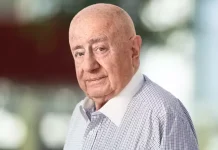Robert De Niro, born on August 17, 1943, in New York City, is an American actor, director, and producer celebrated as one of the most versatile and influential actors of his generation. Known for his meticulous dedication to his roles and for portraying complex, often morally ambiguous characters, De Niro has left an indelible mark on both Hollywood and world cinema. With a career spanning over five decades, he has received two Academy Awards and numerous other accolades, solidifying his place as a cinematic icon. Robert De Niro Biography, Age, Height, Model and Wife
Early Life and Influences
Robert De Niro was born in Manhattan’s Greenwich Village to artist parents of Italian and Irish descent. His father, Robert De Niro Sr., was an abstract expressionist painter, while his mother, Virginia Admiral, was a poet and painter. De Niro was exposed to the arts at an early age, often surrounded by his parents’ creative circle. His parents separated when he was a young child, and he was raised by his mother in New York’s bohemian neighborhoods.
Growing up, De Niro was a shy child but found an outlet in acting. He attended the High School of Music & Art but dropped out at 16 to pursue acting full-time. He trained under legendary acting coaches such as Stella Adler and Lee Strasberg, both proponents of Method acting, a technique that would deeply influence his career. These formative experiences set the stage for De Niro’s intense commitment to his roles, as he honed his craft in New York’s vibrant theater scene before transitioning to film.

Early Career and Breakthrough
De Niro’s early work was in small independent films and theater productions. His breakthrough came with his role in Mean Streets (1973), directed by Martin Scorsese, marking the beginning of one of Hollywood’s most successful director-actor collaborations. De Niro’s performance as the volatile Johnny Boy established him as a major talent. Scorsese and De Niro would go on to work together on numerous projects, with De Niro becoming the director’s on-screen muse.
His next major role in The Godfather Part II (1974) earned him his first Academy Award for Best Supporting Actor. Playing the young Vito Corleone, De Niro famously studied Marlon Brando’s performance from the first Godfather film and spoke almost entirely in Sicilian dialect. His portrayal was lauded for its depth and nuance, marking De Niro’s arrival as a major Hollywood star.
Establishing Stardom: Collaboration with Martin Scorsese
In the late 1970s and early 1980s, De Niro’s career reached new heights, largely due to his continued collaboration with Scorsese. In Taxi Driver (1976), he played the troubled Travis Bickle, a Vietnam War veteran turned taxi driver who becomes disillusioned with society. De Niro’s iconic line, “You talkin’ to me?” has become one of the most famous in film history, and his performance earned him widespread acclaim and an Academy Award nomination.
He won his second Academy Award for Best Actor for his role as Jake LaMotta in Raging Bull (1980). De Niro underwent a remarkable physical transformation for the role, gaining nearly 60 pounds to portray LaMotta in the later stages of his life. His performance is often cited as one of the greatest in cinema history and showcased his dedication to Method acting.
De Niro and Scorsese continued their fruitful collaboration with films such as The King of Comedy (1982), Goodfellas (1990), Casino (1995), and Cape Fear (1991), each allowing De Niro to explore different aspects of his acting range. In Goodfellas, he played Jimmy Conway, a charming yet ruthless mobster, further cementing his place in the gangster genre.
Expanding Horizons: Comedy and Directing
By the late 1980s and 1990s, De Niro began to experiment with comedic roles. In Midnight Run (1988), he played a bounty hunter in a buddy-comedy format, showcasing his comedic timing. His roles in Analyze This (1999) and Meet the Parents (2000) further highlighted his comedic skills, and these films became some of his biggest commercial successes. His ability to transition seamlessly between intense drama and comedy set him apart from many of his contemporaries.
De Niro also ventured into directing, making his debut with A Bronx Tale (1993), a coming-of-age story based on Chazz Palminteri’s one-man show. Set in the 1960s Bronx, the film explored themes of loyalty, father-son relationships, and moral conflict. De Niro’s direction was well-received, demonstrating his talent behind the camera as well as in front of it.
Later Career and Continued Success
In the 2000s and beyond, De Niro continued to deliver notable performances, balancing between mainstream hits and more complex dramatic roles. He starred in Silver Linings Playbook (2012), directed by David O. Russell, where he played an obsessive, sports-loving father. This role earned him an Academy Award nomination, a testament to his sustained excellence over the years.
De Niro’s collaboration with Scorsese continued into his later career with The Irishman (2019), a crime epic that reunited him with Joe Pesci and Al Pacino. De Niro portrayed Frank Sheeran, a mob hitman reflecting on his life choices. The film was hailed as a masterpiece, and De Niro’s performance was widely praised for its depth and subtlety, cementing his status as an acting legend even in his 70s.
Personal Life and Legacy
De Niro’s personal life has often been kept private. He has been married twice, first to actress Diahnne Abbott, with whom he has two children, and later to Grace Hightower, with whom he has two more children. De Niro is also an outspoken political activist, known for his liberal views and criticism of social injustices. In 2002, he co-founded the Tribeca Film Festival in response to the 9/11 attacks, with the aim of revitalizing lower Manhattan and celebrating film.
De Niro’s legacy is one of dedication, intensity, and artistic integrity. His influence on the craft of acting is monumental, with his commitment to realism and Method acting inspiring countless actors worldwide. His willingness to take on challenging roles and portray complex, often unlikable characters has elevated the standards for acting in American cinema. Recognized as one of the greatest actors of all time, Robert De Niro’s impact on film will continue to resonate for generations to come.






